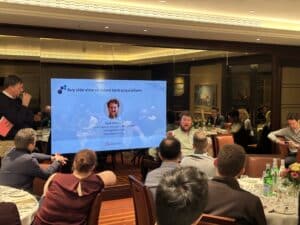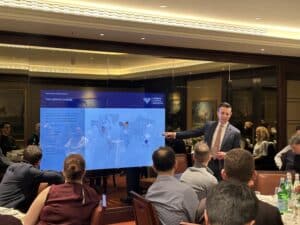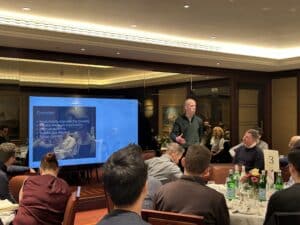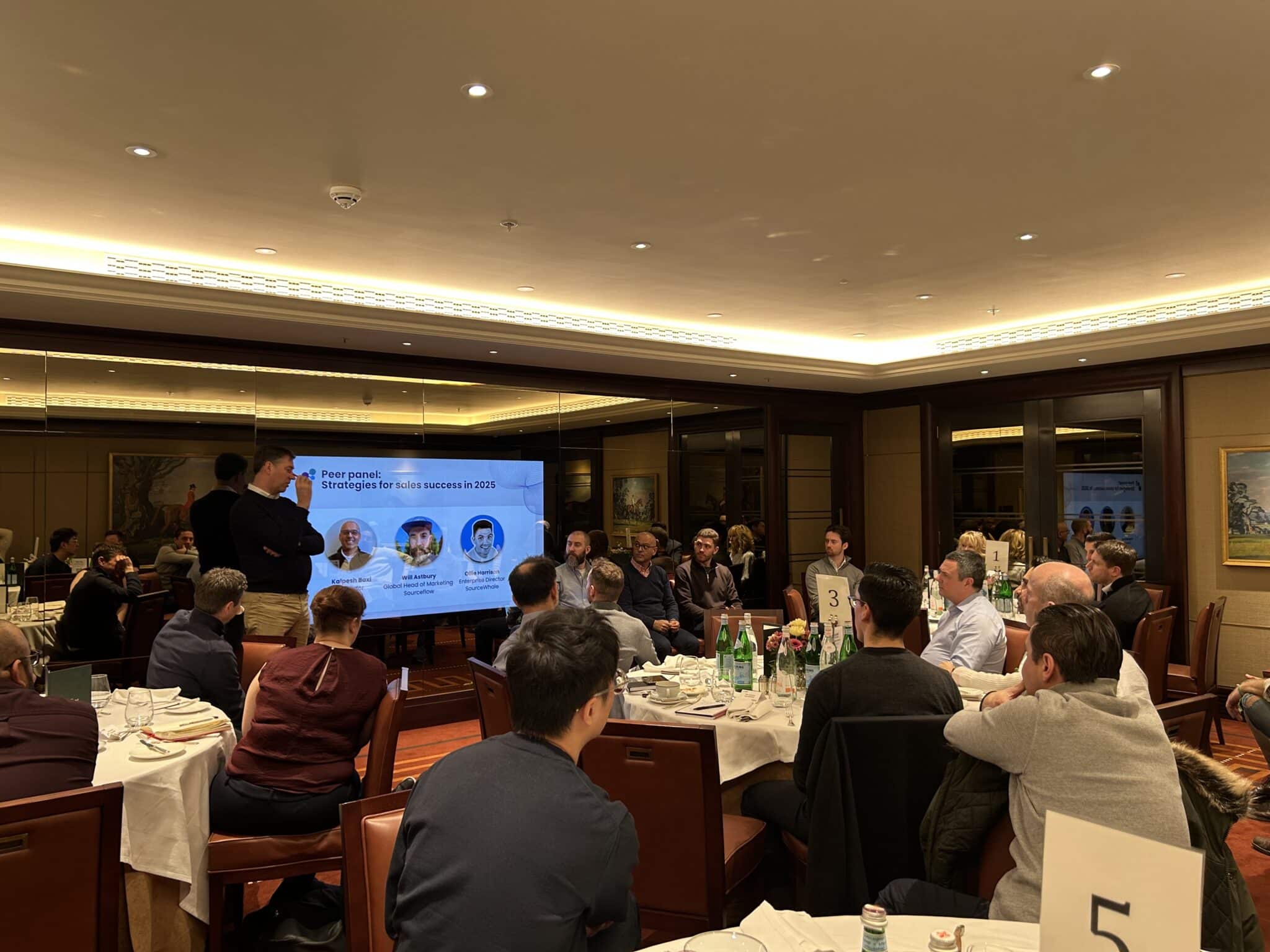On Thursday 13th March 2025, TALiNT Partners brought together 30 leaders from HR and Recruitment tech firms to the Beaumont Hotel in Mayfair for our first Talent Tech Growth Lunch & Learn of the year. Supported by exclusive legal partner, Marriott Harrison, the event offered a deep dive into the evolving landscape of talent tech, changing buyer demands and investor expectations, M&A trends, and sales strategies for success.
Opening the discussion, our UK MD, Alex Evans set the scene with a market overview, highlighting the workforce trends creating opportunities for talent tech providers. “Latest CIPD data indicates that organisations will continue to scale down hiring, and we’re seeing more employers opting to replace natural attrition. We’re also seeing a move towards a decentralised workforce as demand grows for more global, agile solutions, and the continued growth of the gig or project economy.
“According to World Bank, 46.7% (1.57bn) of the global workforce is self-employed and Research & Markets predicts that the global freelance platform market will triple to $13.8bn by 2030 – creating new opportunities in talent tech.”
Update on talent tech M&A
We welcomed expert insights on deal and valuation drivers in talent tech M&A from George Galanopoulos, Partner at Venero Capital Advisors, and an acquirer’s perspective on what’s hot, or not, from Chris O’Connor, Value Creation Director at The Access Group. Chris Mooney, Partner at Marriott Harrison, also offered advice on how to navigate AI regulation and supplier risk.
“Deal rates recovered in 2024 as buyer and seller valuation expectations reconverged, with a total of 405 acquisitions marking a 19% increase YoY and a new record – 9% above the previous peak of 2022,” observed Venero’s George Galanopoulos, who added that PE is still active and North American buyers are increasingly entering the European market.
“Businesses looking to attract investment should focus on strong revenue retention and a well-defined market position. A key differentiator is the business around the solution – it can’t just be a brilliant tool, but needs a strong growth strategy, targeted customers, well-researched pricing, and marketing.”
AI transformation, regulation & risk
In a market where a tax on jobs has contributed to a 32-month consecutive decline in vacancies, tech and talent needs to work smarter. “The cost of a wrong hire has increased significantly, making tools that improve selection and search more valuable than ever,” said Chris O’Connor.
Commenting on Access Group’s acquisition criteria, he added: “We look for strategic fit, growth, scale and a path to profitability. GRR has become much more important – we target 90%. These five have always been key but if you can’t tick the last two the deal is less likely to go through.”
Looking at what is likely to de-rail deals or create due diligence risks, Marriott Harrison’s Chris Mooney urged talent tech founders to review third party supplier contracts to specify agreed services, set the right cap on liability and make it clear that they own the IP, not the developers. “Having your house in order legally inspires confidence in buyers and removes potential blockers for M&A transactions,” he explained.



Strategies for sales success in 2025
With sales cycles lengthening and competition intensifying, talent tech firms are having to rethink their business development and marketing strategies. A panel of sales and marketing leaders and advisors shared insights on how they had refined their approaches to target new clients more successfully and increase the value and loyalty of existing customers.
Will Astbury, Global Head of Marketing at Sourceflow, has focused on better collaboration with sales to support client retention. “Being attentive, being responsive to queries, and content sharing all enable the sales team to leverage insight to add value to existing clients,” he said, “and ensuring that analytics and integrated automation frees them up to be more consultative advisors.”
Will added that he has also looked at incentivising the right behaviour with how leads are followed up, not just lead counting. “ATS adoption is a massive issue across the industry, and lack of visibility of the pipeline for sales. We need to evidence the journey, not waste leads.”
“From a client retention perspective, it’s about targeting the right businesses, the right people at the top of the funnel and, if they aren’t right, getting them out of the funnel at an early stage,” said Ollie Harrison, Enterprise Director at SourceWhale. “Social media touchpoints have become a more important metric and we have experimented with new platforms like TikTok as a new source of leads.”
Ollie added that targeted events to engage with decision-makers has become a much bigger focus for SourceWhale, in the UK and US.
This point was amplified by Kalpesh Baxi, Founder of Baxfield, who said: “Small group events are better than bigger ones, where you can actually network, build engagement, and better understand their problems. It’s also an opportunity to remind clients about unique features they may take for granted and showing how they are having an impact.”
Closing with a comment on the rise of the fractional exec and what founders and CEOs should expect from their NEDs, Kalpesh urged leaders to look at what they really need. “Ask yourself where your blind spots are and why you need something different to help your business scale or growth more profitably,” he said. “What you will most likely need is a board advisor, not a NED, who can help you solve a particular problem with their specialist expertise, whether it’s marketing, sales, tech or talent strategy.”
Problem before solution
The event closed with some final thoughts from host Alex Evans on how to adapt to a more challenging and changing market. “In the gold rush of automation and now AI, providers have tended to lead on the solution and list of benefits which led to lots of products being purchased, but not always optimised. More cost-conscious recruiters and employers want to understand the problem they need to solve now and in the future before considering solutions, so providers need to differentiate in how they articulate their understanding of what organisations really need.”





